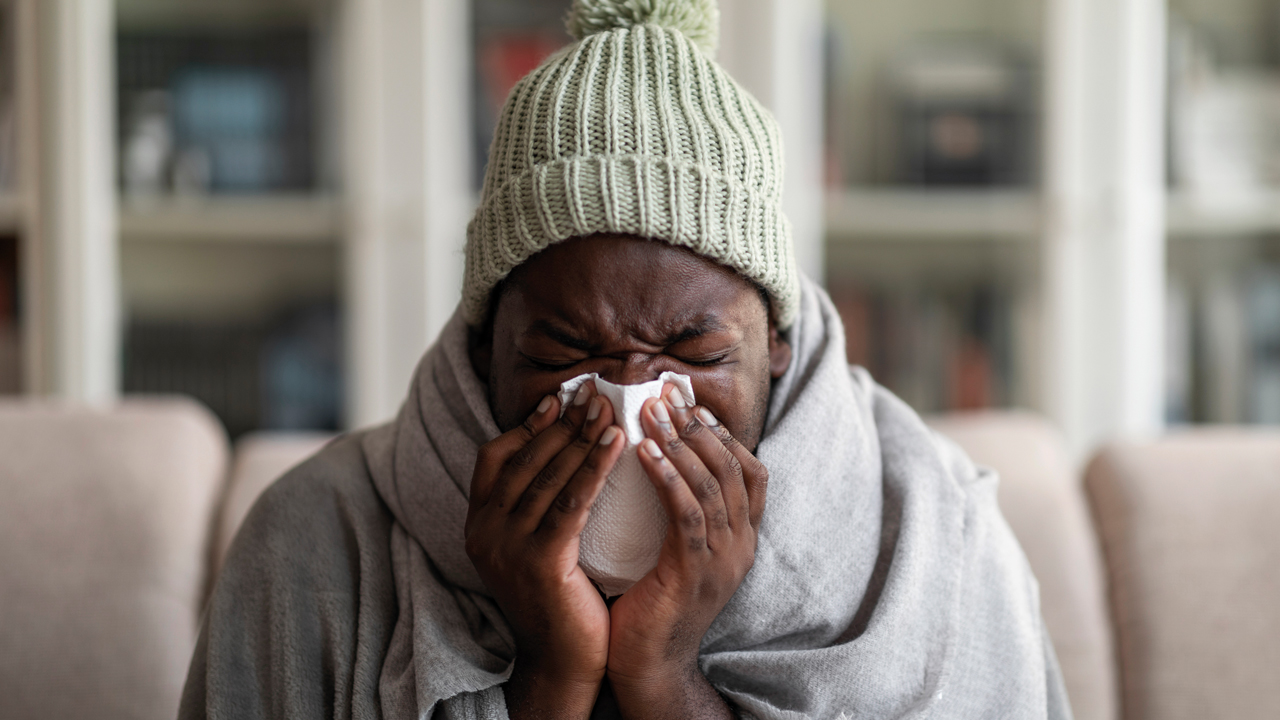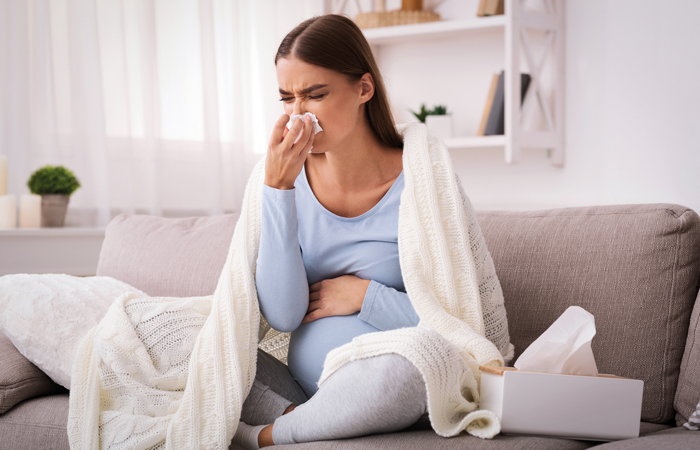In OTC
Follow this topic
Bookmark
Record learning outcomes
Just as winter seems to spring up on us out of nowhere, so too do the common conditions the colder season is accompanied by. For many customers, winter is synonymous with a sore throat, a sniffly nose and a lingering cough. Pharmacy teams can help customers not only manage these conditions, but provide the self care tips and treatment options to make sure they do not pass them on to others. “Refreshing knowledge for winter ailments is always helpful ahead of the cold and flu season, and something all pharmacy teams should be encouraged to do,” says Karen Baker, Care’s expert pharmacist.
Is it the flu or a cold?
“Winter brings colder temperatures, and more time spent indoors, which can foster the spread of viruses,” says Dr Roger Henderson, GP and spokesperson for Olbas. “The common cold and flu are both caused by viral infections, with symptoms including a runny or blocked nose, sore throat, cough and general fatigue.” While the common cold and the flu share certain symptoms, they are different conditions and pharmacy teams should be aware of their differences. A cold is caused by the spread of germs – inhaling droplets from a cough, sneeze or through speaking to someone who is sick, or from transferring droplets from an object to one’s eyes, nose or mouth. These germs belong to a virus – there are a few viruses which can cause a cold, but the most common is the rhinovirus – which inflames membranes in the nose and throat. The flu, on the other hand, is caused by the influenza virus, which is spread through the air when an infected person coughs or sneezes. It can also survive for a short time on surfaces, such as doorknobs or keyboards. What is most distinctly different between the two, however, is the symptoms. A cold usually causes sneezing, a blocked or runny nose, sore throat, congestion and a cough. People may also feel generally tired and unwell, with some suffering from a high temperature and aching muscles. These symptoms come on gradually over two or three days, and most of the time will go away after a few days with self care. Comparatively, the flu comes on suddenly, and symptoms are usually more severe; a sudden high temperature, chills, an aching body, headaches, fatigue, a sore throat, cough and congestion. Some may also experience loss of appetite, diarrhoea, tummy pain and feeling or being sick. Generally, one can ‘get by’ with a cold, but when someone has the flu, they feel they are too unwell to go on as normal.
Before looking at over-the-counter (OTC) treatment options, Dr Henderson notes that: “Self care is also critical, staying hydrated and resting are simple but effective strategies. Preventing the spread of winter illnesses starts with simple hygiene practices. It’s crucial to wash your hands after coughing, sneezing or wiping your nose.” Customers can also use a humidifier to moisten the air to ease congestion and coughs – if customers do not have a humidifier, they can also try steam inhalation by sitting in the bathroom with a hot shower running. They should also be encouraged to eat healthy food and drink a hot lemon and honey drink to soothe a sore throat. Customers can also be recommended OTC medication to help manage their symptoms:
- Paracetamol or ibuprofen to ease aches/lower temperature
- Sea water and saline nasal sprays to wash away allergens and rebalance nasal functions (see boxout)
- Decongestants (see boxout)
- Vapour rubs to ease chesty coughs – suitable for babies and small children
- For those with the flu, an antiviral medication can be suggested.
Be wary that customers may be overlapping treatments unknowingly, for example, some cold and flu remedies already contain paracetamol or ibuprofen and they be may taking too much, so always ask if they are taking anything already before recommending a treatment.

If the pharmacy is running a flu or Covid-19 vaccination clinic, encourage eligible customers to get their jabs for winter.
“Winter brings colder temperatures, and more time spent indoors, which can foster the spread of viruses”
Nasal congestion
Nasal congestion can be one of the most frustrating feelings for customers, leaving them with an uncomfortable feeling of fullness in their nose, face and sinuses. It can be caused by anything that irritates the nose, from infections to allergies. Causes include:
- Sinusitis
- Rhinitis
- Common cold
- Flu
- Allergies
- Alcohol
- Tobacco smoke
- Respiratory syncytial virus (RSV)
- Sleep apnea
- Thyroid disorders
- Some medications.
“Symptoms include difficulty breathing through the nose, a runny nose, and sinus pressure,” says Dr Roger Henderson, GP and Olbas spokesperson. Other symptoms are sneezing (usually if the congestion is caused by an allergy), headache, an itchy or irritated nose and a reduced sense of smell. Luckily, customers can remedy their nasal congestion with treatment found in the pharmacy, or through self care.
It is important that customers drink plenty of fluids, as this means the mucus produced in the nasal passages will be thinner and drain more quickly. Customers can also keep the nasal passages moist by making an at-home saline solution, by mixing one teaspoon of non-iodized salt and a pinch of baking soda with two cups of warm, distilled, filtered or boiled water. Another self care option is steam inhalation; a warm, steamy shower or using a vaporizer are good options. Smoking and smoky atmospheres should be avoided, and personal hygiene emphasised; the mouth and nose should be covered when sneezing, hands should be washed regularly and used tissues discarded immediately. If customers are finding it difficult to breathe at night, recommend that they use extra pillows to prop themselves up a few inches.
As far as over-the-counter solutions go, there are multiple options:
- Decongestants in the form of tablets, nasal sprays and drops. Decongestants work by reducing the swelling of blood vessels in the nose, providing short term relief and opening the airways. Examples include decongestants containing pseudoephedrine, which usually starts to work in 15-30 minutes. Nasal sprays containing xylometazoline and oxymetazoline provide more immediate relief and are effective for eight to 10 hours. Shorter-acting ingredients include ephedrine. Nasal decongestants should not be used by babies or children under six, or for more than seven days, as this can cause rebound congestion, nor should they be used by people taking other medicines or those with diabetes, high blood pressure, an enlarged prostate, increased eye pressure in the glaucoma or an overactive thyroid gland. Children aged six to 11 should stop use after five days
- Corticosteroids, anti-inflammatory drugs, are available as nasal sprays for those whose nasal congestion is caused by allergic rhinitis. They are suitable for customers 18 years and older and examples include beclomethasone and fluticasone
- Sea water or saline nasal sprays can be bought in the pharmacy and work by deactivating and neutralising allergens in the nose. They form a barrier preventing allergens from irritating the nasal mucosa. They are suitable for pregnant women, babies, young children and people who can’t take other medicated treatments.
A wolf in sheep’s clothing
What may seem like a cold or the flu could be Covid-19. “Covid-19, while also viral, can present similar symptoms [to cold and flu], with the addition of loss of taste and smell, fever, and more severe respiratory issues,” says Dr Henderson. Covid-19, caused by the SARS-CoV-2 virus, shares cold-like symptoms as well as shortness of breath, extreme tiredness, a new, continuous cough (coughing a lot for more than an hour, or three or more coughing episodes in 24 hours), digestive symptoms, fever, chills and head/body aches. Some people will recover after a few days like recovering from a cold, while for others it can be a more serious illness. As Covid-19 is easily passed on through close contact with people who have the virus, encourage customers to stay at home if they have symptoms and have a high temperature, or do not feel well enough to do their normal activities. If customers or their children no longer have a temperature, they can go back to their normal activities. Customers eligible for Covid-19 treatments, should take a rapid lateral flow test as soon as they get symptoms, according to NHS guidelines. Similarly to a cold or flu, customers should get plenty of rest, onboard fluids and eat healthily, taking paracetamol or ibuprofen if they feel uncomfortable. For those with a cough, honey can be used to soothe the throat – although this should not be given to babies under 12 months.
The main flu and Covid-19 Seasonal Vaccination Programme will run from 3 October 2024. Residents in a care home for older adults, adults aged 65 years and older, and persons aged six months to 64 years in a clinical risk group will be offered the Covid-19 vaccine on the NHS. Pharmacy teams can encourage customers who qualify to vaccinate themselves this winter.
“Preventing the spread of winter illnesses starts with simple hygiene practices”
Sore throat
Customers may only suffer from one symptom, like a sore throat, without developing a full-blown cold or flu. “Sore throats, often a precursor to these illnesses, can be due to viral infections or irritants like air,” says Dr Henderson. Often when people are rundown, they may develop a sore throat as a first sign of weakened immunity. However, it can also be caused by smoking, allergies, a bacterial infection like strep throat or conditions like tonsilitis, glandular fever or laryngitis. Customers with a sore throat may complain of a painful throat, especially when swallowing; a dry, scratchy throat; redness in the back of the mouth; swollen neck glands; a mild cough and/or bad breath. Children will have similar symptoms but may also appear less active and could get a high temperature – above 38°C. Luckily, a sore throat is, majority of the time, self-limiting. Pharmacy teams can give customers crucial advice to nip their sore throat in the bud. Self care recommendations include gargling warm, salty water (not for children), staying hydrated, eating cool/soft foods, avoiding smoking and smoky places, rest and sucking ice cubes (not for children).
There are also OTC products to help ease sore throat symptoms, Dr Henderson reaffirmed: “Pharmacy teams play a pivotal role in guiding customers through the winter months, with nearly half of shoppers relying on their advice when it comes to purchasing OTC products.” Paracetamol, ibuprofen and medicated lozenges containing local anaesthetic, antiseptic or anti-inflammatory medicine are all available without prescription to help ease pain.

A temperature is considered high if it is 38°C or more, in children and adults.
“Pharmacy teams play a pivotal role in guiding customers through the winter months, with nearly half of shoppers relying on their advice when it comes to purchasing OTC products”
Ah-hem!
Another symptom of a cold or flu that customers may experience in isolation is cough. Usually caused by a viral or bacterial infection, a cough can also be the result of smoking, heartburn, allergies or post-nasal drip. A cough is the body’s way of trying to clear the breathing passages of fluids, irritants, foreign particles and microbes. Again, the best thing for customers to do is rest, drink plenty of fluids and if they have a high temperature or feel unwell, to stay at home. Pharmacy teams can also recommend drinking a hot lemon and honey drink, made up of the juice of half a lemon, one or two teaspoons of honey and boiling water. Customers – not including small children – should drink this while it is still warm. For pain, recommend paracetamol or ibuprofen, and there are various cough medicines customers may opt for; cough syrup, lozenges and medicine – some of which should not be given to children under 12, so make sure to check the label. Inflammatory medicine is used to treat flare-ups in people whose symptoms have suddenly become worse at least twice over the past 12 months, and who are already using inhalers.
If COPD causes low blood oxygen levels, some people may be advised to have oxygen at home through nasal tubes or a mask. Very severe COPD may be treated with non-invasive ventilation (NIV). This involves wearing a mask connected to a machine that helps air get into the lungs and makes breathing easier. NIV is usually given in hospital but is occasionally given to people at home if their COPD is severe but stable. Surgery to remove part of the lung, or a full lung transplant, is usually only suitable for a small number of people with severe COPD whose symptoms aren’t controlled with medicines.
Pneumonia red flags
Pneumonia is an infection in the lungs which causes inflammation and is more common in the autumn and winter months. People can develop pneumonia suddenly over 24-48 hours, or more slowly over a few days. Either way, it can be extremely serious, so knowing symptoms that are cause for referral is crucial. Any of the following symptoms are recognised as red flags, indicating pneumonia, by the NHS:
- A cough (coughing up yellow or green mucus)
- Shortness of breath
- A high temperature
- Chest pain
- An aching body
- Fatigue
- Loss of appetite
- Making wheezing noises when breathing – babies may make grunting noises
- Feeling confused – common in older people.
If customers have had a cough for more than three weeks, are coughing up blood, have chest pain that comes and goes when breathing or coughing, or are feeling short of breath, they should ask for an urgent GP appointment or get help from NHS 111. Customers should call 999 if they:
- Are struggling to breathe (choking, gasping, or unable to speak)
- Have pale, blue or blotchy skin, lips or tongue
- Suddenly feel confused
- Cannot wake their baby/the baby feels floppy.


